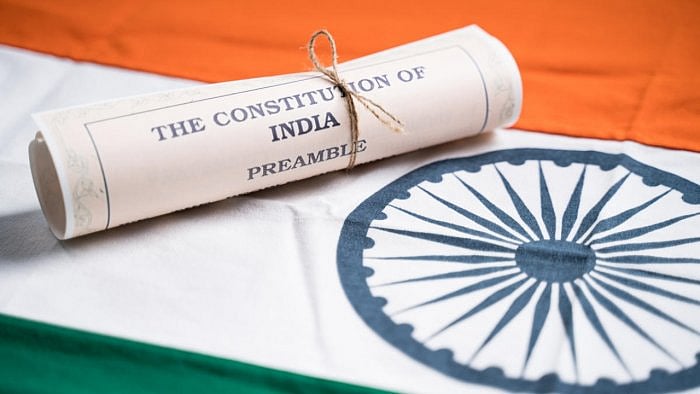
The new chapter in the Constitution would include issues related to 'simultaneous election', 'sustainability of simultaneous elections' and 'common electoral roll' for Lok Sabha, state legislative assemblies, panchayats and municipalities so that the three-tier simultaneous polls could be held together 'in one go', they explained.
Credit: iStock Photo
The demand for removing two words – “secular” and “socialist” – from the Preamble to the Constitution speaks more about the intent of those who make the demand than about the content of the Constitution. In recent days, the demand was first made by Uttar Pradesh Chief Minister Yogi Adityanath who said the words were “a brutal assault on the soul of India”. RSS general secretary Dattatreya Hosabale said the terms were inserted when “the country had no functioning Parliament, no rights, no judiciary” and so their inclusion needed a review. Vice-President Jagdeep Dhankhar and several BJP leaders, including ministers, have stated dissent against the words, describing secularism as anti-Sanatana Dharma and a Western concept. Though it has been made now on the occasion of the 50th anniversary of the Emergency, the demand is old. The government has in the past used the “watermark of the original Preamble” in announcements on the occasion of the Republic Day.
The words were added to the Preamble in 1976 through the 42nd Amendment which made many basic changes to the Constitution. After the Emergency, the Janata Party government restored the Constitution to its original form but retained the words. The government, which included A B Vajpayee and L K Advani, did not find it necessary to drop them. The Supreme Court, in the Bommai case in 1994, ruled that secularism is a basic feature of the Constitution. Last year, it rejected petitions challenging the inclusion of the words. The Court observed that the words had been widely accepted and their meanings clearly understood by the people. It said: “The word ‘secular’ denotes a Republic that upholds equal respect for all religions. ‘Socialist’ represents a Republic dedicated to eliminating all forms of exploitation – whether social, political, or economic.” A private member’s bill seeking deletion of these additions failed in parliament some years ago.
As the Court said, India has developed its own interpretation of the words. Secularism means equal respect for all religions and the assurance not to penalise the profession and practice of any faith. Socialism refers to the idea of economic and social justice which ensures that no citizen is disadvantaged due to economic or social circumstances. The demand to excise the words is irrelevant and unnecessary because they did not add anything new to the Constitution. They only gave expression to what was already there. The challenge to these words only shows the opposition to these ideas. This demand is intended to send out the message that the Constitution does not endorse secularism as it is understood and should be rejected.
